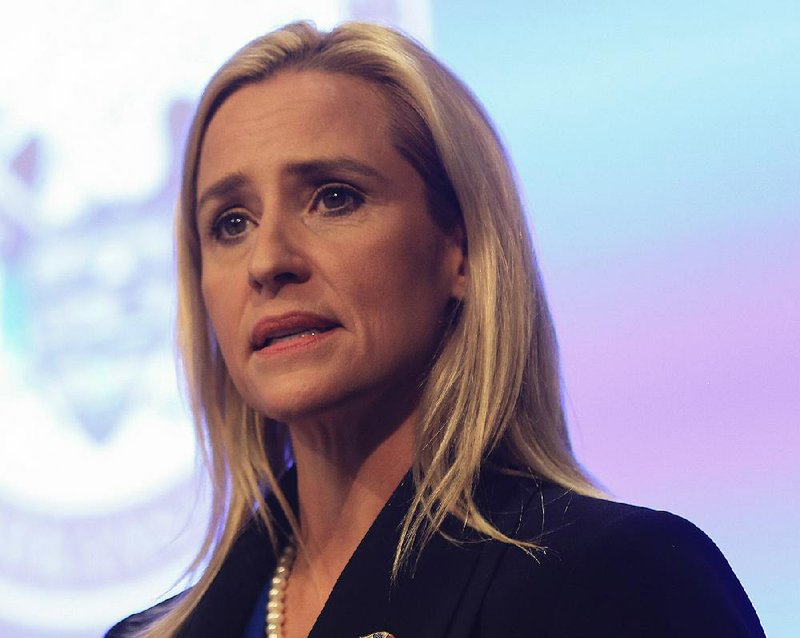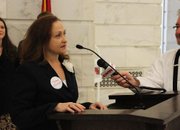The U.S. Supreme Court on Tuesday refused to revisit a federal judge's 2014 ruling striking down Arkansas' 2013 ban on abortions after 12 weeks of pregnancy if a heartbeat could be detected.
RELATED ARTICLE
http://www.arkansas…">Court refuses officer's lawsuit-immunity case
Arkansas Attorney General Leslie Rutledge asked the court in October to reconsider the ruling, which was upheld by the 8th U.S. Circuit Court of Appeals on May 27. Rutledge cited questions about viability -- the point at which a fetus can live independently outside the womb -- as noted in the opinion of the 8th Circuit panel.
The panel, which included two U.S. circuit judges from Arkansas, spoke of its obligation to follow U.S. Supreme Court precedent, which allows women to seek abortions until the point of viability -- which generally has been regarded as 25 to 28 weeks of pregnancy. But the opinion also engaged in a philosophic discussion of viability, noting that medical and technological advances had made the viability standard "more difficult" and have moved the point of viability "further back toward conception."
In Rutledge's brief asking the high court to grant a writ for a petition of certiorari to review the Arkansas case, which began with a lawsuit filed shortly before the law was to take effect in 2013, she argued that the case "is an ideal vehicle for the Court to revisit its viability jurisprudence."
The lawsuit was filed in Little Rock by two Arkansas doctors who perform abortions and feared the law would endanger their medical licenses. It was backed by the American Civil Liberties Union and the Center for Reproductive Rights, which cited the landmark 1973 Supreme Court decision Roe v. Wade and subsequent cases establishing a woman's right to have an abortion until the point of viability -- which until Act 301 of 2013 was set at 25 weeks of pregnancy in Arkansas.
U.S. District Judge Susan Webber Wright agreed with the plaintiffs and on March 14, 2014, threw out the law's 12-week provision as unconstitutional. She left two sections of the law intact, saying they didn't violate constitutional protections. They require a woman seeking an abortion in Arkansas to undergo an ultrasound to see whether a fetal heartbeat can be detected, and if it can, require doctors to pass that information on to the woman.
Out of about 7,000 annual requests to review cases, the U.S. Supreme Court takes up only a fraction of them to hear during the court's next term. Most requests are denied without comment, as was the situation Tuesday after a review of the case by the justices Friday, according to the high court's docket.
Rutledge said in a news release that she was disappointed. She said Act 301, known as the Arkansas Human Heartbeat Protection Act, was "passed by the elected legislators of this state and was a reasonable way to protect the lives of more unborn children."
She added, "The court should have granted certiorari to change its current doctrine that prevents a state from prohibiting abortions until later in pregnancy."
"Arkansas and other states have a profound interest in defending the life of the unborn and as Attorney General, I had a duty to fully defend this statute," she said.
State Sen. Jason Rapert, R-Bigelow, who sponsored the act, also issued a news release Tuesday.
"I am disappointed that at least five of nine individual Supreme Court justices find it so easy to take up cases that destroy the traditions and values of Americans when it is politically expedient, but they hide themselves from true justice when they have within their power the ability to stop our nation from killing 1 million innocent babies every year," he said, in an apparent reference to the high court's ruling in June legalizing same-sex marriage nationwide.
"They add their names to those who have failed to act when it was in their power to do so and become complicit with the seven men who unleashed the abortion holocaust in our nation in 1973, which has now killed nearly 60 million little babies," Rapert said, in reference to the Roe decision.
Rapert said he was "comforted" that the "informed consent provisions" of the 2013 law have been left intact.
"I am satisfied that we fought the good fight all the way to the U.S. Supreme Court and can say with confidence that we did all we could do in this battle," Rapert said, calling the act "the strongest pro-life law since" Roe v. Wade. "I am grateful for the support of the majority of the Arkansas people, the majority of the Arkansas legislature, Gov. Asa Hutchinson and Attorney General Rutledge for their unwavering support of the Arkansas Heartbeat Protection Act. Our efforts have not been in vain."
The law, which was passed by legislators March 6, 2013, but was halted before its effective date, barred abortions after 12 weeks except in cases of a medical emergency, when necessary to protect the life of the mother or in the event of a "highly lethal fetal disorder."
Rita Sklar, executive director of the ACLU's Arkansas chapter, said in a telephone interview in response to the comments by Rapert and Rutledge: "If viability was what the attorney general wanted to have the court revisit, then I guess she would have introduced evidence that fetuses are viable at 12 weeks, but because no such evidence exists, she can't submit that evidence. The judges can't make decisions in a vacuum. There were no new issues of viability since the original ruling."
Sklar said that while there have been medical advances, "it doesn't mean doctors can perform miracles."
She added, "If anybody had any contact with the parents of premature babies and the struggles they face at 21, 22, 23 or even 24 weeks, they would know just how ridiculous a concept it is that a fetus would be viable at 12 weeks."
She said she has seen firsthand the "fight to stay alive" of a baby delivered at 24 weeks.
"This is nothing to be fooling around with," Sklar said. "This is serious business that should be left to the family. Legislators should stop trying to play doctor."
In New York City, at the Center for Reproductive Rights' main office, President Nancy Northrup applauded the high court's denial of Rutledge's petition.
"Arkansas politicians cannot pick and choose which parts of the constitution they want to uphold," she said in a news release. "The Supreme Court has never wavered in affirming that every woman has a right to safely and legally end a pregnancy in the U.S. -- and this extreme abortion ban was a direct affront to that right."
The center has been watching Rutledge's request, as well as a request from North Dakota, which has asked the high court to review its thrown-out ban on abortions after six weeks of pregnancy. The court could decide Monday whether to take up that case.
Taclott Camp, deputy director of the ACLU's Reproductive Freedom Project, responded to the court's rejection of the Arkansas case by saying, "Arkansas cannot veto a woman's decision to have an abortion, period. This personal, medical decision rests with a woman, her family and her doctor -- not politicians. We are gratified but unsurprised that the court found nothing worthy of their review in this case."
A Section on 01/20/2016


